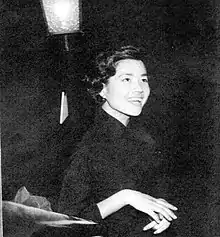Chisako Hara
Chisako Hara (原知佐子, Hara Chisako, 6 January 1936 – 19 January 2020)[1] was a Japanese actress best known for starring in the Akai and the Kishibe no arubamu series.[2][3]
Chisako Hara | |
|---|---|
 | |
| Born | Chisako Tahara 1 June 1936 Takaoka Town (now Tosa), Kōchi Prefecture, Japan |
| Died | 19 January 2020 (aged 83) Tokyo, Japan |
| Nationality | Japanese |
| Occupation | Actress |
| Years active | 1956–2019 |
| Spouse | Akio Jissōji (1963–2006) |
Biography
Chisako Hara was born Chisako Tahara (田原知佐子, Tahara Chisako) on 6 January 1936 in Takaoka Town (now Tosa), Kōchi Prefecture.[1] She gave her film debut at the Shintoho studios in 1956,[1][3] but later moved to Toho,[3] where she had a starring role in Kinuyo Tanaka's Girls of the Night (1961) and smaller parts in films of Mikio Naruse and Shirō Toyoda.[1] In the early 1960s, she became a freelancer and also started appearing on television.[3] During the 1970s, she became famous for her roles in the Akai and Kishibe no arubamu TV series.[2][3][4]
Hara was married to director Akio Jissōji from 1963 to 2006 (his death) and also starred in many of his films.[2] In the 2017 book Heretic Film History: The World of Shintoho, Hara discussed her years at the Shintoho studio with Noriko Kitazawa and others.[5]
Her final film appearance was in Spring 2019 in Nosari no shima,[2] which was released after her death in 2021.[6] She died at the age of 84 on 19 January 2020 in a Tokyo hospital of maxillary cancer.[2]
Selected filmography
Film
- 1960: The Approach of Autumn
- 1961: Girls of the Night
- 1964: Pale Flower
- 1967: The Wife of Seishu Hanaoka
- 1971: The Ceremony
- 1998: Wait and See
- 1998: Murder on D Street
- 2001: Lily Festival
- 2002: Dark Water
- 2021: Nosari no shima
Television
- 1974–2016: Ultra Series
- 1975–1977: Akai Series
- 1977: Kishibe no arubamu
References
- "原知佐子". Kinenote (in Japanese). Retrieved 6 September 2023.
- "原知佐子さん死去 「赤いシリーズ」「岸辺のアルバム」など出演、84歳". Hochi (in Japanese). 21 January 2020. Retrieved 6 September 2023.
- "のさりの島 (Nosari no shima official site)". Nosarinoshima.com (in Japanese). Retrieved 6 September 2023.
- "蘇る!山口百恵「赤いシリーズ」の"衝撃"(3)原知佐子が語る山口百恵の魅力". Asagei Plus (in Japanese). Tokuma Shoten. 8 May 2014. Retrieved 3 December 2017.
- 映画秘宝編集部(編), ed. (2017). Heretic Film History: The World of Shintoho (in Japanese). Yosensha. ISBN 978-4-8003-1159-7.
- "のさりの島". Kinenote (in Japanese). Retrieved 6 September 2023.